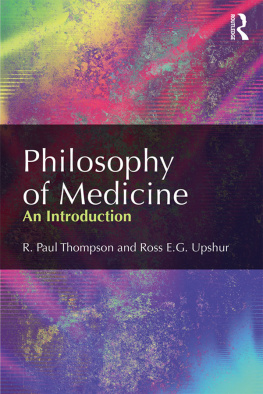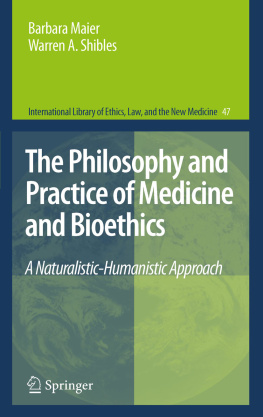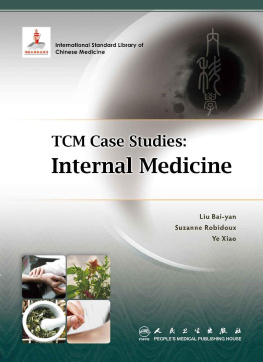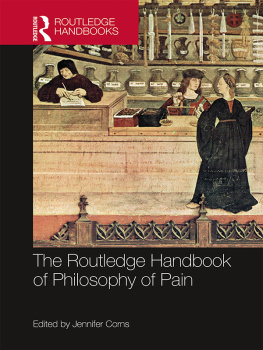Philosophy of Medicine
What kind of knowledge is medical knowledge? Can medicine be explained scientifically? Is disease a scientific concept, or do explanations of disease depend on values? What is evidence-based medicine? Are advances in neuroscience bringing us closer to a scientific understanding of the mind?
The nature of medicine raises fundamental questions about explanation, causation, knowledge and ontology questions that are central to philosophy as well as medicine. This book introduces the fundamental issues in philosophy of medicine for those coming to the subject for the first time, including:
- Understanding the physicianpatient relationship: the phenomenology of the medical encounter.
- Models and theories in biology and medicine: what role do theories play in medicine? Are they similar to scientific theories?
- Randomised controlled trials: can scientific experiments be replicated in clinical medicine? What are the philosophical criticisms levelled at RCTs?
- The concept of evidence in medical research: what do we mean by evidence-based medicine? Should all medicine be based on evidence?
- Causation in medicine.
- What do advances in neuroscience reveal about the relationship between mind and body?
- Defining health and disease: are explanations of disease objective or do they depend on values?
- Evolutionary medicine: what is the role of evolutionary biology in understanding medicine? Is it relevant?
Extensive use of empirical examples and case studies are included throughout the book, including debates about smoking and cancer, the use of placebos in randomised controlled trials, controversies about PSA testing and research into the causes of HIV. This is an indispensable introduction for those teaching philosophy of medicine and philosophy of science.
R. Paul Thompson holds appointments as Professor in the Institute for the History and Philosophy of Science and Technology, the Department of Ecology and Evolutionary Biology, and the Department of Philosophy, University of Toronto, Canada.
Ross E.G. Upshur is a physician, and Professor in the Department of Family and Community Medicine and Dalla Lana School of Public Health, University of Toronto, Canada. He is also Head of the Division of Clinical Public Health, Dalla Lana School of Public Health, University of Toronto, Scientific Director, Bridgepoint Collaboratory for Research and Innovation, and Assistant Director, Lunenfeld Tanenbaum Research Institute, Sinai Health Systems.
Philosophy of Medicine
An Introduction
R. Paul Thompson and
Ross E.G. Upshur

First published 2018
by Routledge
2 Park Square, Milton Park, Abingdon, Oxon OX14 4RN
and by Routledge
711 Third Avenue, New York, NY 10017
Routledge is an imprint of the Taylor & Francis Group, an informa business
2018 R. Paul Thompson and Ross E.G. Upshur
The right of R. Paul Thompson and Ross E.G. Upshur to be identified as authors of this work has been asserted by them in accordance with sections 77 and 78 of the Copyright, Designs and Patents Act 1988.
All rights reserved. No part of this book may be reprinted or reproduced or utilised in any form or by any electronic, mechanical, or other means, now known or hereafter invented, including photocopying and recording, or in any information storage or retrieval system, without permission in writing from the publishers.
Trademark notice: Product or corporate names may be trademarks or registered trademarks, and are used only for identification and explanation without intent to infringe.
British Library Cataloguing-in-Publication Data
A catalogue record for this book is available from the British Library
Library of Congress Cataloging-in-Publication Data
Names: Thompson, R. Paul, author.
Title: Philosophy of medicine : an introduction/ R. Paul Thompson and Ross E.G. Upshur.
Description: New York : Routledge, 2017. | Includes bibliographical references and index.
Identifiers: LCCN 2017005902 | ISBN 9780415501071 (hardback : alk. paper) | ISBN 9780415501095 (pbk. : alk. paper)
Subjects: LCSH: MedicinePhilosophy.
Classification: LCC R723. T47 2017 | DDC 610.1dc23
LC record available at https://lccn.loc.gov/2017005902
ISBN: 978-0-415-50107-1 (hbk)
ISBN: 978-0-415-50109-5 (pbk)
ISBN: 978-1-315-15984-3 (ebk)
Typeset in Bembo
by Apex CoVantage, LLC
For Aria Victoria Hylton
The world is yours; grasp what it offers with vitality.
Paul
To Kim, Olivia and Sara for their love and unwavering support.
Ross
Contents
Guide
Figures
Tables
Despite the difficulty for physicians like myself, unused to the language of philosophical discourse, I believe I am correct that a new understanding of medicine will not be possible without a return to basic philosophical issues.
(Eric Cassell 2004)
Philosophy of medicine is an emerging field. The philosophy of specific sciences was dominated until the late 1950s by philosophy of physics. Beginning in the late 1950s with Morton Beckners The Biological Way of Thought, biology began to receive attention. Philosophy of biology is now a mature field of philosophical enquiry. Since the Renaissance, aspects of what today is analytic philosophy of medicine have received sporadic attention. Only in the last twenty or so years has a consolidated field of enquiry emerged. One of the catalysts was the rise of evidence-based medicine. Its commitment to randomised controlled trials (RCTs) as the gold standard of evidence and meta-analyses of related RCTs as the strongest basis for clinical decision-making attracted the attention of a number of philosophers. Among the trailblazers are John Worrall, Nancy Cartwright, John Dupr and David Papineau. They focussed initially on the logic of RCTs and the causal claims supposedly generated by them, based on Ronald A. Fishers arguments in The Design of Experiments and the work of Jerzy Neyman and Karl Pearson.
Today, philosophy of medicine is a burgeoning field. During the last decade, numerous PhD theses have been defended in this field, a clear sign that it has found its place within philosophy of science. This book attempts to capture the growing enthusiasm for, and coalescing of, this field. It covers a number of the standard issues within philosophy of science causality, determinism, reductionism, and theories and models, for example with a focus on these within a medical context. Some topics are more specific to philosophy of clinical medicine RCTs and biostatistics more generally, and phenomenological aspects of clinical practice, for example. Other topics are more relevant to philosophy of bench medicine; there is no other non-loaded term for this area, which includes human genetics, immunology, physiology, biochemistry and neurosciences. There are no doubt topics that some would have liked to see included and, contrariwise, topics some would have recommend excluding. This is an evolving field.
As we explain in the introduction and , we consider philosophy of medicine to be a sub-field of philosophy of science. As a result, the main analytic areas of philosophy involved are epistemology, metaphysics and logic; ethics is not central. It is clear that values permeate all of our claims to know and our investigations of the world around us. Exploring that recognition, although important, is only tangentially connected to philosophy of medicine. It cannot be ignored but is not its central focus.













